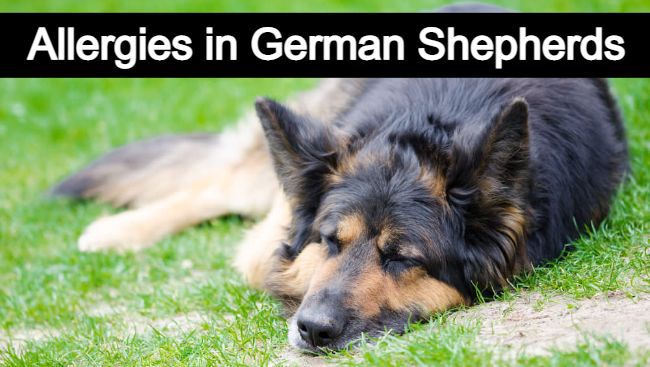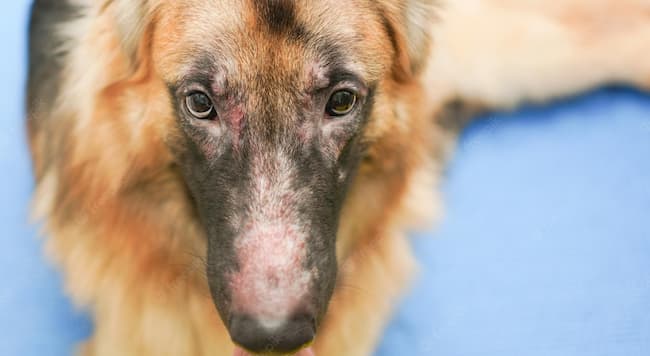If you are the owner of a German Shepherd, you may be wondering if your dog is susceptible to allergies. Allergies are very common in German Shepherds, and there are a number of things that you need to know in order to keep your dog healthy and happy.

In this article, we will discuss the most common allergies in German Shepherds, as well as how to treat them. We will also provide some tips for preventing allergies from developing in the first place.
Allergies in German Shepherds
Allergies in German Shepherds are quite common. In fact, allergies are the most common health problem in this breed. German Shepherds can be allergic to a variety of things including pollen, dust, dander, and even certain foods.
This can vary depending on the individual dog, but allergies are typically divided into two categories: seasonal allergies and food allergies. There are also allergies like flea allergy, pollen allergy, and environmental allergies in German Shepherds that we are going to discuss below.
Seasonal Allergies
Seasonal allergies are those that occur at certain times of the year, usually in response to changes in the environment. The most common seasonal allergies in German Shepherds are allergies to pollen and dust.

Pollen is a fine powder that is released into the air by plants. It is necessary for plant reproduction, but it can cause problems for people and animals who are allergic to it. When pollen enters the body of someone who is allergic to it, the immune system will release histamines in an attempt to get rid of the allergen. This can cause a variety of symptoms including sneezing, itching, watery eyes, and runny nose.
Dust allergies are similar to pollen allergies, but they are caused by dust particles instead of pollen. Dust allergies can also cause sneezing, itching, watery eyes, and runny nose. See what causes German Shepherd howling.
Food Allergies
Food allergies are another type of allergy that is quite common in German Shepherds. These allergies occur when the body has an adverse reaction to certain proteins found in food. The most common food allergies in German Shepherds are allergies to beef, dairy, wheat, and chicken.
Symptoms of food allergies can vary, but they can include itching, vomiting, diarrhea, and ear infections. If you think that your dog may have a food allergy, it is important to speak to your veterinarian so that they can help you diagnose the problem and find suitable food for your dog.
Flea Allergy
Flea allergies are also quite common in German Shepherds. This type of allergy occurs when the dog is allergic to the saliva of fleas. When a flea bites a dog, it will release saliva into the wound. This can cause an allergic reaction in some dogs, causing symptoms like itching, hot spots, and hair loss.
If you think that your dog may have a flea allergy, it is important to speak to your veterinarian. They will be able to prescribe medication to help relieve the symptoms and may also recommend using a flea preventative.
Pollen Allergy
As we mentioned earlier, pollen allergies are quite common in German Shepherds. This type of allergy occurs when the dog is exposed to pollen from plants. When the pollen enters the body, it will cause an allergic reaction, resulting in symptoms like sneezing, itching, watery eyes, and a runny nose.
If you think that your dog may have a pollen allergy, it is important to speak to your veterinarian. They will be able to prescribe medication to help relieve the symptoms. You may also want to consider using an air purifier in your home and keeping your dog inside during times when pollen levels are high.
Environmental Allergies
Environmental allergies are another type of allergy that can affect German Shepherds. This type of allergy occurs when the dog is allergic to something in its environment, such as mold or dust mites.
Symptoms of environmental allergies can include sneezing, itching, watery eyes, and a runny nose. If you think that your dog may have an environmental allergy, it is important to speak to your veterinarian. They will be able to prescribe medication to help relieve the symptoms.
How To Treat Allergies in German Shepherds?
If your dog has allergies, it is important to speak to your veterinarian. They will be able to diagnose the problem and recommend a course of treatment. Allergies in German Shepherds will vary depending on the type of allergy, but it may include medication, dietary changes, or environmental modifications.

Medication
There are a variety of medications that can be used to treat allergies in German Shepherds. These medications can be used to relieve the symptoms of allergies and may also be used as a preventive measure.
Some common medications used to treat allergies in German Shepherds include antihistamines, corticosteroids, and immunotherapy. Antihistamines can be used to relieve the symptoms of allergies, such as itching and sneezing. Corticosteroids can also be used to relieve the symptoms of allergies and may also be used as a preventive measure. Immunotherapy is a type of treatment that can be used to help the dog build up immunity to allergies.
Also, know Why do German Shepherds whine so much?
Dietary Changes
If your dog has a food allergy, it is important to speak to your veterinarian about making dietary changes. They will be able to recommend a food that is suitable for your dog and free of the proteins that they are allergic to.
If your dog has a flea allergy, it is important to use a flea preventative. This will help to reduce the number of fleas on your dog and will also help to prevent allergies from occurring.
Environmental Modifications
If your dog has environmental allergies, there are a few things that you can do to make its environment more allergy-friendly. These modifications may include using an air purifier in your home and keeping your dog inside during times when pollen levels are high. You may also want to consider using hypoallergenic bedding and shampoo for your dog.
Conclusion
Allergies in German Shepherds can be a frustrating problem for both the dogs and their owners. However, with the help of your veterinarian, you can find a treatment that will work for your dog. With the proper treatment, your dog can live a happy and healthy life. For more informative articles, get back to our German Shepherds site.

